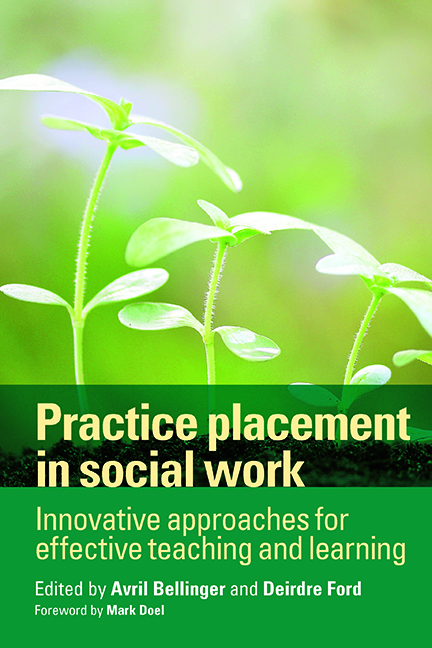Book contents
- Frontmatter
- Dedication
- Contents
- Foreword
- Notes on contributors
- Introduction
- One Student-led services
- Two International placements: learning from a distance
- Three The outside looking in – an independent social worker’s experience of practice educator work
- Four ‘Do you have to be white to pass this course?’ Developing support for black and minority ethnic students in a predominantly white area
- Five Men in social work education: building a gendered alliance
- Six Hidden in plain sight: use of an arts-based method for critical reflection
- Seven Getting our hands dirty: reconnecting social work education as if the earth matters
- Eight Social media for students in practice
- Nine Developing placement capacity in the third sector
- Ten Observations of student practice: what difference does observer qualification make?
- Eleven Filling the gap: constructive responses to the erosion of training standards for practice educators
- Twelve The concept of integrity in relation to failing and marginal students
- Thirteen Cultivating discretion: social work education in practice and the academy
- Index
Ten - Observations of student practice: what difference does observer qualification make?
Published online by Cambridge University Press: 01 September 2022
- Frontmatter
- Dedication
- Contents
- Foreword
- Notes on contributors
- Introduction
- One Student-led services
- Two International placements: learning from a distance
- Three The outside looking in – an independent social worker’s experience of practice educator work
- Four ‘Do you have to be white to pass this course?’ Developing support for black and minority ethnic students in a predominantly white area
- Five Men in social work education: building a gendered alliance
- Six Hidden in plain sight: use of an arts-based method for critical reflection
- Seven Getting our hands dirty: reconnecting social work education as if the earth matters
- Eight Social media for students in practice
- Nine Developing placement capacity in the third sector
- Ten Observations of student practice: what difference does observer qualification make?
- Eleven Filling the gap: constructive responses to the erosion of training standards for practice educators
- Twelve The concept of integrity in relation to failing and marginal students
- Thirteen Cultivating discretion: social work education in practice and the academy
- Index
Summary
Introduction
Practice observations can be pivotal to students’ transformational learning and the formation of a professional identity. We suggest that key elements underpinning the process of transformation might be the qualifications and the independence of the person observing the student.
In this chapter, we explore the impact of practice observations on students’ learning and the formation of their professional identity. Based on findings from a pilot study, we consider the importance of both the professional qualifications and the independence of the person observing the student in practice. As social work educators, we are increasingly concerned about the potential erosion of standards in practice education. An emphasis on practice educator qualifications has been particular to the UK, although national aspirations to have all students taught and assessed by someone with an additional pedagogic qualification could not be realised (Parker, 2007; Bellinger, 2010a). The requirement for practice educators to reach a particular standard has disappeared entirely as the current practice educator framework has no links to academic accreditation. Students can now be assessed by almost anyone, or any agency. Accordingly, the importance of pedagogy in the supervision and assessment of learners in practice is no longer supported by a national framework or through resource provision (Bellinger, 2010a). Instead, in the UK, the College of Social Work (TCSW, 2012b) emphasises the need for students to be supported by qualified social workers, whose post requires them to be registered with the Health and Care Professions Council (HCPC).
Unusually, the undergraduate programme where the authors work had, since 2001, retained a requirement that all students must be observed and assessed in practice by social workers holding the Practice Teacher Award (CCETSW, 1991a) or equivalent. The move towards more conventional arrangements provided an opportunity to explore the impact of observer qualification and relationship on the student experience.
Context for the study
In the UK, the principle of observing a student's ‘live’ practice as a mode of assessment was formally introduced in the Diploma in Social Work (CCETSW, 1991b). The primary purpose of the observation was to assess the student against national core competencies and a range of value requirements.
- Type
- Chapter
- Information
- Practice Placement in Social WorkInnovative Approaches for Effective Teaching and Learning, pp. 149 - 164Publisher: Bristol University PressPrint publication year: 2016

